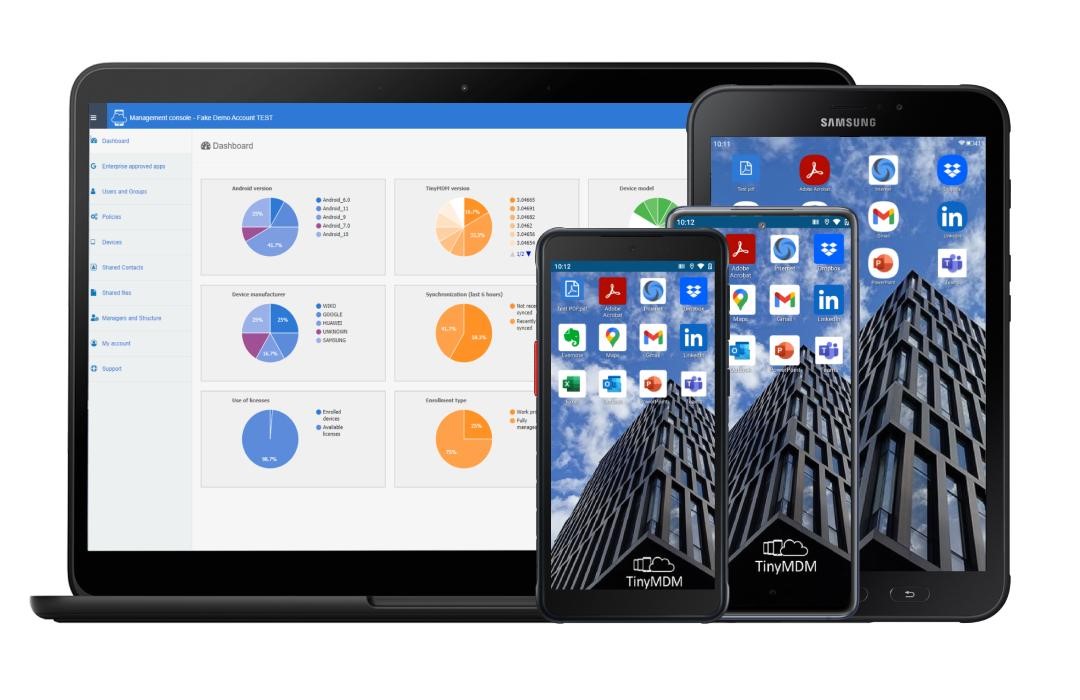Optimize and enhance the reliability of your mobile device management
Smartphones and tablets began to be a part of many companies’ daily lives more than a decade ago, and the hybridization of work has greatly accentuated this phenomenon in recent years. Indeed, there are 1.9 billion mobile workers as of the start of 2022 and 9 out of 10 businesses depend on their employees’ ability to access business data from their own smartphones. Also, 61% of global business leaders agree to say that companies not deploying enterprise mobile apps and empowering their employees with mobile devices are at a competitive disadvantage.
Indeed, this trend has enabled businesses to deliver services in a more efficient and a faster way to customers, improving workforce productivity. But there is a huge difference between having mobile devices in your workplace and defining an effective mobile strategy. The challenges for both big enterprises and SMBs lie in identifying all the risks of having unmanaged mobile devices (data leaking, security threats, brand reputation, loss of time and productivity…), and deal with them in a way that protects the company assets and respects employees’ privacy.
The dangers of mobile devices misuse
If properly managed by an administrator the digital tool is a real asset to employee productivity (75% of employees said their smartphones help them be more productive), this mobilization trend also comes with more than one downside and remains double-edged. Unmanaged, misuse of mobile devices can be really harmful: it is considered that 54% of SMEs have already faced a security breach involving sensitive information, that 25% of small businesses have already had to deal with a stolen (or compromised) device, and that in more than half of the cases no password policy was in place. It is therefore vital for businesses, no matter the size of the company, to retain full control of their devices and protect sensitive data: managing staff mobile phones with a Mobile Device Management solution (MDM) has become a top priority. It is an essential responsibility for the IT department in order to ensure data security and the maintenance of staff productivity.
Even small and medium-sized businesses, which often have few resources dedicated to IT or a dedicated IT team, need to opt for a mobile device management strategy in order to avoid the misuses that may be inherent to the installation of malicious applications, the loss or theft of a mobile device or the consequence of employee misuse.
How MDM supports businesses and productivity
MDM for Android (or Android Mobile Device Management) refers to the administration of mobile devices in the enterprise, usually via a third-party solution that allows for remote and centralized management of the entire fleet of Android enterprise mobile devices available within the company. Through an interface reachable via a web browser, a non-expert technician will be able to manage the mobile terminals on 3 dimensions:
- Productivity: remote installation of applications, synchronization of files and contacts, triggering of updates, remote control of devices in case of problems…
- Restriction: prohibit inappropriate Internet sites for work, block unauthorized applications, switch the device to kiosk mode, etc.
- Security: lock or unlock devices remotely, geolocate devices, force passwords, prohibit unsecured networks…
Companies often have to manage a wide range of devices, from company-owned devices (COBO – Company Owned / Business Only) to employees’ personal smartphones, all combined with a mix of different usages. With all of these different levels of ownership, IT admins need to make sure business apps and data are safe on any terminal used for work, no matter who owns it, or how big is the organization. An MDM mobile management solution allows companies to remotely and seamlessly cover all those situations, managing both company-owned business devices and personal smartphones used for business purposes, in a BYOD (Bring Your Own Device) type configuration.
In addition to giving IT more time to conduct their daily business, Android MDM solutions can definitively help them boost employees’ productivity, reduce the threat of data security breaches, and make the work atmosphere both more flexible and secure.
TinyMDM, officially approved by Android EMM for three different management sets, guarantees the reliability and compliance of the solution to securely manage devices within an organization.


